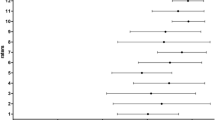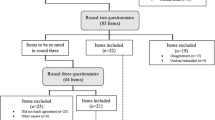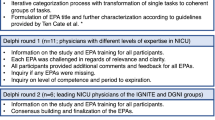Abstract
Background
The care of the acutely ill patient in hospital is often sub-optimal. Poor recognition of critical illness combined with a lack of knowledge, failure to appreciate the clinical urgency of a situation, a lack of supervision, failure to seek advice and poor communication have been identified as contributory factors. At present the training of medical students in these important skills is fragmented. The aim of this study was to use consensus techniques to identify the core competencies in the care of acutely ill or arrested adult patients that medical students should possess at the point of graduation.
Design
Healthcare professionals were invited to contribute suggestions for competencies to a website as part of a modified Delphi survey. The competency proposals were grouped into themes and rated by a nominal group comprised of physicians, nurses and students from the UK. The nominal group rated the importance of each competency using a 5-point Likert scale.
Results
A total of 359 healthcare professionals contributed 2,629 competency suggestions during the Delphi survey. These were reduced to 88 representative themes covering: airway and oxygenation; breathing and ventilation; circulation; confusion and coma; drugs, therapeutics and protocols; clinical examination; monitoring and investigations; team-working, organisation and communication; patient and societal needs; trauma; equipment; pre-hospital care; infection and inflammation. The nominal group identified 71 essential and 16 optional competencies which students should possess at the point of graduation.
Conclusions
We propose these competencies form a core set for undergraduate training in resuscitation and acute care.


Similar content being viewed by others

Reference
Bion JF, Heffner JE (2004) Challenges in the care of the acutely ill. Lancet 363:970–977
Franklin C, Mathew J (1994) Developing strategies to prevent inhospital cardiac arrest: analyzing responses of physicians and nurses in the hours before the event. Crit Care Med 22:244–247
Hillman KM, Bristow PJ, Chey T, Daffurn K, Jacques T, Norman SL, Bishop GF, Simmons G (2002) Duration of life-threatening antecedents prior to intensive care admission. Intensive Care Med 28:1629–1634
McQuillan P, Pilkington S, Allan A, Taylor B, Short A, Morgan G, Nielsen M, Barrett D, Smith G, Collins CH (1998) Confidential inquiry into quality of care before admission to intensive care. BMJ 316:1853–1858
Neale G (1998) Risk management in the care of medical emergencies after referral to hospital. J R Coll Physicians (Lond) 32:125–129
McGloin H, Adam SK, Singer M (1999) Unexpected deaths and referrals to intensive care of patients on general wards. Are some cases potentially avoidable? J R Coll Physicians (Lond) 33:255–259
National Confidential Enquiry into Patient Outcome and Death (2005). An acute problem.http://www.ncepod.org.uk/2005report/
Vincent C, Neale G, Woloshynowych M (2001) Adverse events in British hospitals: preliminary retrospective record review. BMJ 322:517–519
Buist MD, Moore GE, Bernard SA, Waxman BP, Anderson JN, Nguyen TV (2002) Effects of a medical emergency team on reduction of incidence of and mortality from unexpected cardiac arrests in hospital: preliminary study. BMJ 324:387–390
Bellomo R, Goldsmith D, Uchino S, Buckmaster J, Hart GK, Opdam H, Silvester W, Doolan L, Gutteridge G (2003) A prospective before-and-after trial of a medical emergency team. Med J Aust 179:283–287
Priestley G, Watson W, Rashidian A, Mozley C, Russell D, Wilson J, Cope J, Hart D, Kay D, Cowley K, Pateraki J (2004) Introducing Critical Care Outreach: a ward-randomised trial of phased introduction in a general hospital. Intensive Care Med 30:1398–1404
Parr M (2004) Critical care outreach: some answers, more questions. Intensive Care Med 30:1261–1262
Shen J, Joynt GM, Critchley LA, Tan IK, Lee A (2003) Survey of current status of intensive care teaching in English-speaking medical schools. Crit Care Med 31:293–298
Phillips PS, Nolan JP (2001) Training in basic and advanced life support in UK medical schools: questionnaire survey. BMJ 323:22–23
Harrison GA, Hillman KM, Fulde GW, Jacques TC (1999) The need for undergraduate education in critical care. (Results of a questionnaire to year 6 medical undergraduates, University of New South Wales and recommendations on a curriculum in critical care). Anaesth Intensive Care 27:53–58
Soar J, Perkins GD, Harris S, Nolan J (2003) The immediate life support course. Resuscitation 57:21–26
Smith GB, Osgood VM, Crane S (2002) ALERT—a multiprofessional training course in the care of the acutely ill adult patient. Resuscitation 52:281–286
Perkins GD, Nolan J, Harris S, Mitchell S, Smith GB, Gabbott D, Short A, Bion JF (2004) The ACUTE initiative. Resuscitation 62:319
Perkins GD, Bion JF (2004) The Acute Care Undergraduate TEaching Initiative (ACUTE). Crit Care Med 32:A65
Goldfrad C, Vella K, Bion JF, Rowan KM, Black NA (2000) Research priorities in critical care medicine in the UK. Intensive Care Med 26:1480–1488
Ringsted C, Schroeder TV, Henriksen J, Ramsing B, Lyngdorf P, Jonsson V, Scherpbier A (2001) Medical students’ experience in practical skills is far from stakeholders’ expectations. Med Teach 23:412–416
Smith GB, Poplett N (2002) Knowledge of aspects of acute care in trainee doctors. Postgrad Med J 78:335–338
Shen J, Joynt GM, Critchley LA, Tan IK, Lee A (2003) Survey of current status of intensive care teaching in English-speaking medical schools. Crit Care Med 31:293–298
Frankel HL, Rogers PL, Gandhi RR, Freid EB, Kirton OC, Murray MJ (2004) What is taught, what is tested: findings and competency-based recommendations of the Undergraduate Medical Education Committee of the Society of Critical Care Medicine. Crit Care Med 32:1949–1956
Barrett H, Bion JF (2005) An international survey of training in adult intensive care medicine. Intensive Care Med 31:553–561
Spady WG (1988) Organising for results: the basis of authentic restructuring and reform. Educ Leadersh 10:4–8
Rees CE (2004) The problem with outcomes-based curricula in medical education: insights from educational theory. Med Educ 38:593–598
Moercke AM, Eika B (2002) What are the clinical skills levels of newly graduated physicians? Self-assessment study of an intended curriculum identified by a Delphi process. Med Educ 36:472–478
Stewart J, O’Halloran C, Harrigan P, Spencer JA, Barton JR, Singleton SJ (1999) Identifying appropriate tasks for the preregistration year: modified Delphi technique. BMJ 319:224–229
Jones J, Hunter D (1995) Consensus methods for medical and health services research. BMJ 311:376–380
Acknowledgements
We thank the contributors to the Delphi process, the nominal group members (Mrs. Catherine Baldock, Professor Matthew Cooke, Dr. Brian Cuthbertson, Dr. Sheena Hubble), Sara Harris, Administration Manager at the Resuscitation Council (UK) for administrative support and Bob Harris for developing the ACUTE website.
Author information
Authors and Affiliations
Corresponding author
Additional information
This study was supported by an unrestricted research grant from the Resuscitation Council (UK). The funding organisation hosted the website for phase 1 of the study and provided accommodation and travel costs for the nominal group meeting. The funding organisation did not contribute to the study design, analysis or interpretation of results or decision to submit for publication.
Electronic Supplementary Material
Rights and permissions
About this article
Cite this article
Perkins, G.D., Barrett, H., Bullock, I. et al. The Acute Care Undergraduate TEaching (ACUTE) Initiative: consensus development of core competencies in acute care for undergraduates in the United Kingdom. Intensive Care Med 31, 1627–1633 (2005). https://doi.org/10.1007/s00134-005-2837-4
Received:
Accepted:
Published:
Issue Date:
DOI: https://doi.org/10.1007/s00134-005-2837-4



